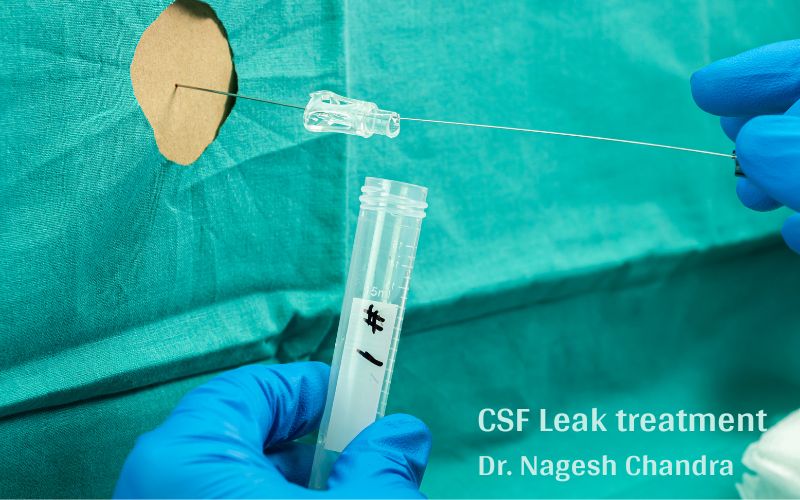Ever experienced throbbing head pain accompanied by nausea and neck stiffness? These could be signs of a Cerebrospinal Fluid (CSF) leak, a condition where the fluid surrounding your brain and spinal cord escapes through a hole in the connective tissues. Causes range from injuries to medical procedures like lumbar punctures or epidurals, and sometimes, the cause remains elusive. The good news? Most cases resolve on their own within days, with no long-term issues. However, persistent symptoms may require mending the tear in the connective tissue. Below, a top Neurosurgeon in Delhi explains the symptoms, causes, and treatment of Cerebrospinal Fluid (CSF) leaks sharing about this condition in-depth. Read on.
What is a spinal fluid leak?
A spinal fluid leak occurs when there’s a hole in the protective layers surrounding the brain and spinal cord, known as meninges. These layers hold the cerebrospinal fluid (CSF), vital for flushing out contaminants, transporting nutrients, and cushioning the brain and spinal cord.
The outermost layer, the dura mater, is a tough tissue responsible for maintaining CSF within the meninges. However, if a breach occurs, CSF escapes, leading to symptoms like headaches, nausea, and neck stiffness. While most cases resolve without severe complications, in rare instances, a spinal fluid leak can lead to serious outcomes such as stroke, coma, or even death.
Symptoms of a spinal fluid leak
Persistent head pain might be a symptom of a Cerebrospinal Fluid (CSF) leak. However, not everyone with a leak will have this symptom. The pain is often positional, intensifying when upright and easing when lying down. Typically located at the back of the head, it can vary in severity and location.
Other common symptoms include:
- Nausea and vomiting
- Neck pain or stiffness
- Imbalance
- Sensitivity to light or sound
- Changes in hearing
- Pain between shoulder blades
- Arm numbness or pain
- Dizziness
- Altered thinking, akin to brain fog
- Changes in vision or taste
- Fatigue
- Facial pain or numbness
Causes of spinal fluid leak
The causes of a spinal fluid leak can vary. They often originate from incidents or medical procedures affecting the protective layers around your brain and spinal cord. Some common causes of spinal fluid leak are:
- Trauma: Accidents or injuries, such as a severe blow to the head or spine, can create a breach in the protective tissues, leading to a leak.
- Medical Procedures: Invasive medical procedures like lumbar punctures, spinal surgeries, or epidural injections may result in a tear in the connective tissues.
- Spontaneous Leaks: In some cases, a spinal fluid leak can occur spontaneously without an apparent cause.
Risk factors associated
Certain factors can increase the chances of experiencing a Cerebrospinal Fluid (CSF) leak, either in the spine or the cranial region.
Risk factors for spinal CSF leaks include:
- Previous spine surgery or procedures.
- Conditions like Marfan syndrome or Ehlers-Danlos syndrome, affect connective tissues and may lead to joint hypermobility and dislocations.
For cranial CSF leaks, risk factors may include:
- Prior skull surgeries.
- Obstructive sleep apnea.
- Head trauma.
- Presence of a tumour at the skull base.
- Irregularities of the inner ear or skull base.
Complications
Complications may arise if a cranial CSF leak remains untreated. Neglecting the issue can potentially lead to serious problems, such as meningitis, and an inflammation of the membranes surrounding the brain. Another concern is tension pneumocephalus, a condition where air enters the spaces around the brain, posing a risk to neurological well-being.
On the spinal front, untreated CSF leaks could result in subdural hematomas, characterised by bleeding on the brain’s surface. While some CSF leaks often resolve on their own, seeking medical attention from a medical professional can prevent these complications, leading to a smoother recovery process.
Diagnosis of Cerebrospinal Fluid Issue in Dwarka
If a Cerebrospinal Fluid (CSF) leak is suspected, your doctor may suggest several tests to pinpoint the issue accurately.
- Analysis of Nasal Fluid: This test detects beta-2 transferrin, a protein mainly found in CSF.
- CT Scan: It is a non-invasive procedure utilising X-rays and advanced computer technology to generate detailed images of the brain’s structure.
- MRI Scan: This imaging technique uses magnets and radio frequencies to provide detailed organ and structure images. It helps in locating and assessing CSF leaks.
- Cisternogram — CT or Nuclear Medicine: These tests involve a spinal tap to introduce a fluid into the CSF, helping identify the presence and source of a CSF leak.
- CT Cisternogram: It pinpoints the site of a CSF leak, using a contrast medium and a spinal tap followed by a CT scan.
- Pledget Study: It confirms CSF leakage into the nose or mastoid by injecting a radioactive tracer during a spinal tap, with cotton pads collecting fluid for analysis.
- Myelogram Scan: This involves injecting a contrasting substance into the spinal cord while utilising MRI or CT scans to identify tears or ruptures in the dura.
CSF leaks treatment in Dwarka, Delhi
Treatment for CSF leaks is important, especially for patients with persistent symptoms. Repairing tears in the dura promptly reduces headache pain and lowers the risk of meningitis.
- Nasal CSF Leak: Endoscopic nasal CSF leak closure is done through the nostrils. It repairs the leak using nasal tissue or a biomaterial graft. Hospital stay duration depends on the leak’s size, typically a few days. Some may require a lumbar drain before discharge.
- Ear CSF Leak: This closure involves a skin incision behind the ear, accessing the leak near the mastoid. The opening is sealed by repairing with tissue or a graft.
- Spinal CSF Leak: This treatment involves when blood or fibrin patches are injected into the spinal canal under CT guidance. If unsuccessful, duraplasty, or surgical repair of the dura, might be required.
The outlook for those experiencing a Cerebrospinal Fluid (CSF) leak is generally positive, depending on the underlying cause. Fortunately, in most cases, the issue resolves with no lasting symptoms. However, recurring CSF leaks could signal a potential concern—high CSF pressure (hydrocephalus). It’s crucial to address this condition with the help of a neuro doctor in Dwarka promptly. Regular monitoring and medical guidance are key to ensuring a favourable outlook and preventing recurrent leaks. In cases where hydrocephalus is diagnosed, targeted interventions are important for the patient’s well-being.

